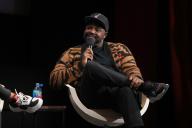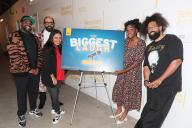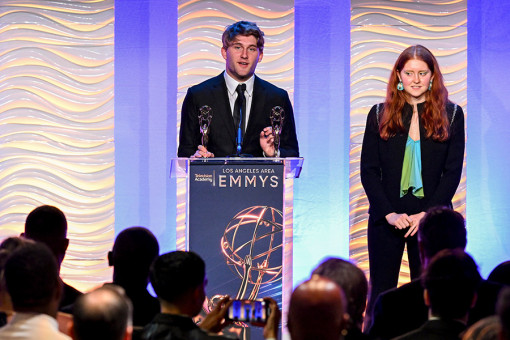Comedian Cristela Alonzo dreamed of a career as a Broadway performer — until she was told at age eighteen by her voice teacher that as a Latina, she could do West Side Story and A Chorus Line, and then she'd be done. In the years before Hamilton's color-blind casting, she toured with both musicals and discovered that her teacher was right.
At that point, "I decided that the only chance I was ever going to have was by writing my own thing," she said. "And that's how I ended up with stand-up. It came naturally to me because of the stage. I was comfortable being in an audience, doing act-outs, doing voices."
Watch the replay of this hilarious event.
Stand-up gave Alonzo her own voice, and in 2014 she became the first Latina to create, write, produce and star in her own primetime sitcom, Cristela, which aired on ABC; her special, Middle Classy, is now streaming on Netflix. On August 2, Alonzo joined comedy colleagues at "The Biggest Laugh: The Journey from Stand-Up to Screen," a Television Academy members' event, held at the Academy campus in L.A.'s NoHo Arts District.
The evening's panel included: actor-writer-comedian Ayo Edebiri (The Bear, FX on Hulu); actor-comedian Ron Funches (Loot, Apple TV+) and comedian-bandleader Reggie Watts (The Late Late Show with James Corden, CBS). Actor-comedian Brett Gelman (Stranger Things, Netflix) moderated.
Some comedy careers are forged in adversity. Alonzo first turned to stand-up as therapy after her mother died, to talk about her family. Funches, who became a father at twenty, chose to discuss his son's autism.
"Once I found out he had autism, it became a thing of, 'Oh, I have to defend his differences and who he is as a person. And if I'm going to do that, I have to go after what I want and show how different I am,'" he said, to audience applause. "I'm lucky that it worked out."
Funches harnessed one of his greatest assets — a distinctive speech rhythm — to his advantage in stand-up. Alonzo realized while observing comedian Steven Wright that writing — especially specific word choices ("parakeet" rather than "bird") — was the key to her comedy. And Watts's musical and theater skills bolstered his early comedy efforts.
"I used to write funny songs on the piano, but it was really high school — we had competitive dramatics," he said. "I would ask if I could improvise, so I was doing that, but I was also doing musical bits in there. When I revisited comedy more seriously, in the mid-'90's, I would play piano and then I'd take a break and just talk about dumbass shit for a while."
As with Alonzo, the panelists' comedy has led to other projects. Watts had been music director-composer-sidekick on the IFC talk-show parody Comedy Bang! Bang! before he was tapped to fill those roles for real on James Corden's late-night show. Edebiri was a staff writer on Apple TV+'s Dickinson and a consulting producer on FX's What We Do in the Shadows, experience she drew upon after starting work on The Bear and feeling a touch of imposter syndrome.
"I knew my role, that I had to be the straight man for the humor to work," she said. "So that was really helpful. Also, Chris Storer and Joanna Calo [coshowrunners of The Bear] were open to improvisation. So that's where I was like, 'Oh, I can kind of shine here. I can make choices that might not necessarily be on the page, but I can see them happening.'"
The comedians take different approaches to their specials: some are more improvised, some scripted; some comfort audiences and others challenge by focusing on issues. Whatever the perspective, "My job," Funches said, "is to make people happy."


























